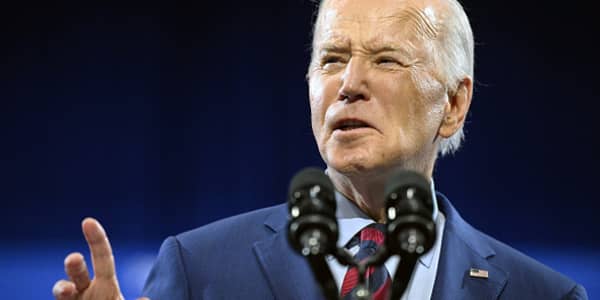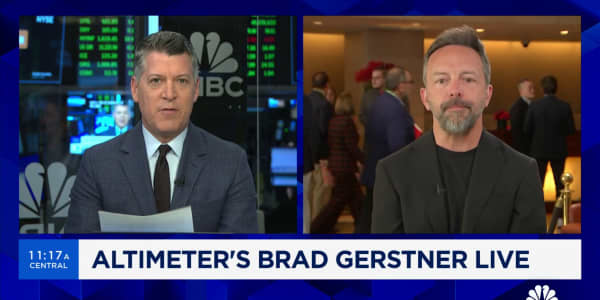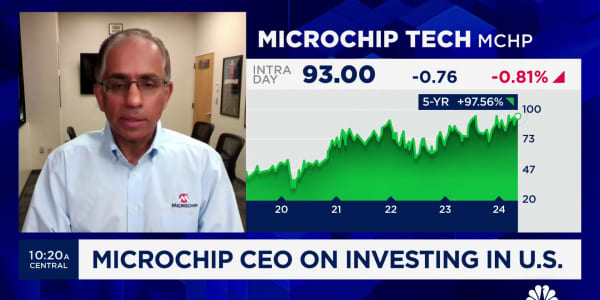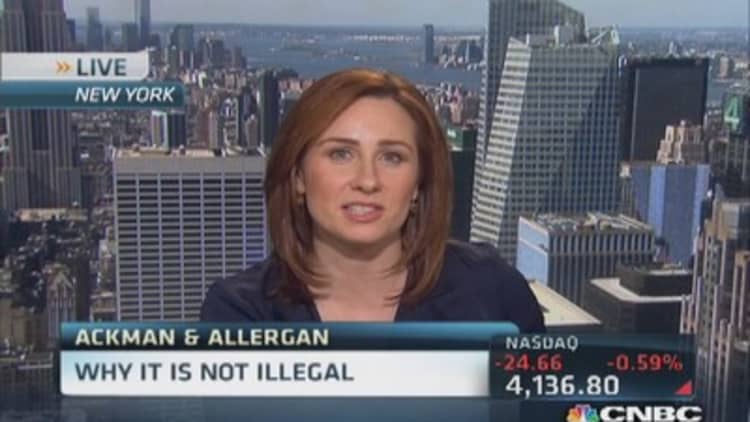
Smelling financial opportunity in a Canadian drug company with a penchant for making deals, hedge-fund manager William Ackman teamed up with Valeant Pharmaceuticals to help launch a hostile bid for the rival manufacturer Allergan.
Ackman built a substantial position in the target company that escaped notice entirely until the eve of the takeover announcement.
Once news of the bid went public, Allergan shares skyrocketed in value, making Ackman a neat paper profit and revealing strong market support for the potential deal.
So what's wrong with all that?
A lot, according to some market watchers, who consider Ackman's gambit to be the latest flavor of legal insider trading—and an unappetizing one as well.
Read MoreI did not front run Allergan stock, Ackman says
"What is clear is that prior to consummating an actual deal with Valeant, he was in the marketplace, and my suspicion is the SEC will look at that and try to determine the facts to see whether he was front running Valeant's bid," said former Securities and Exchange Commission Chairman Harvey Pitt in a CNBC interview on April 22, the day after the takeover attempt was announced.
An SEC spokesman declined to comment on whether his agency was reviewing the trades.
Ackman and Valeant's hostile bid for Allergan comes at a time when shareholder activism in general is on the rise.
So far this year, activist regulatory filings have risen 27 percent compared to the same period last year, according to figures kept by FactSet's SharkWatch.
With 18 new activist filings through the last week of April alone, the second quarter is off to an exceptionally busy start. Some of the other major deals include shareholder Lloyd Miller's announcement of a nearly 20 percent stake and a desire for independent directors at the sandwich maker Cosi, and the hedge fund Relational Investors' disclosure of a 9 percent stake in the hazardous waste disposal company Clean Harbors, which the fund is urging to rethink its business mix.
Read MoreCarl Icahn defends Ackman, slams Lipton
Ackman, who has successfully advocated for change at companies like Procter & Gamble and Kraft in the past, is well versed in the activist trade.
"This is a hugely important development," Whitney Tilson, a rival hedge fund manager who is also a friend of Ackman, said in an email. "I think every activist as well as every company looking to make an acquisition that is large (or) where resistance is expected will be looking to do this."
In the case of Allergan, Ackman has said repeatedly that although he had material, nonpublic information about Valeant's plan to try and take over Allergan, building his stake ahead of a likely pop in the stock didn't constitute insider trading.
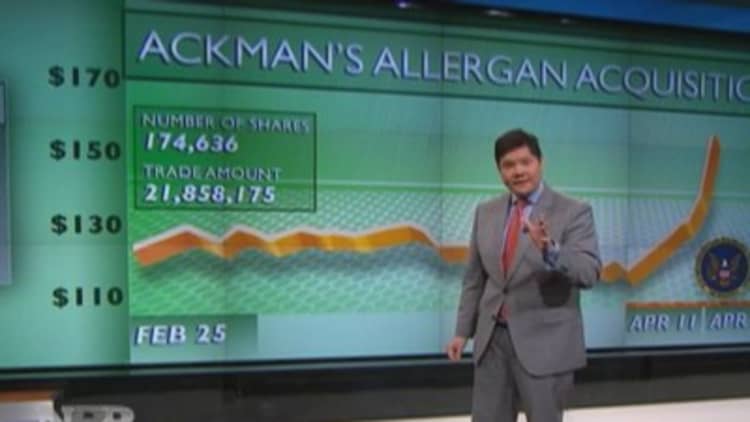
"You are actually permitted to trade on inside information as long as you didn't receive the information from someone who's breached fiduciary duty, a duty of confidentiality," he said during a CNBC interview on April 23. "What's happened here is that Valeant came to us and said, 'Look, if you can help us acquire Allergan, we'd like to work with you.'"
The whole point of that partnership, he added, was to build a large voting position in Allergan stock.
Still, the story of how Ackman's hedge fund, Pershing Square Capital Management, and Valeant stealthily built a powerful stake in Allergan by narrowly dodging public-filing requirements until the last possible moment is a study in canny market strategy—and could serve as a primer for how activist hedge funds and deal-minded corporations may do business in the future.
Read MoreBig money activism: Helpful or harmful?
The groundwork began in January, when Ackman met Valeant chief J. Michael Pearson, a former McKinsey & Co. consultant who took over the Canadian drug maker in 2008, through a mutual friend then working for Ackman at Pershing Square.
The two batted around various acquisitions, and finally settled upon Allergan, the Irvine, California, pharmaceutical manufacturer whose skin treatment Botox, among other products, was a good complement to Valeant's suite of beautification, over-the-counter, neurological and other products.
On Feb. 25, Pershing Square and Valeant established a joint venture called PS Fund 1 that would be tasked with building a large position in Allergan and voting those shares in favor of a Valeant takeover, according to regulatory filings. As part of the deal, Valeant contributed a nominal amount of cash—$75.9 million, to be specific—with the balance to be bankrolled by Pershing Square.
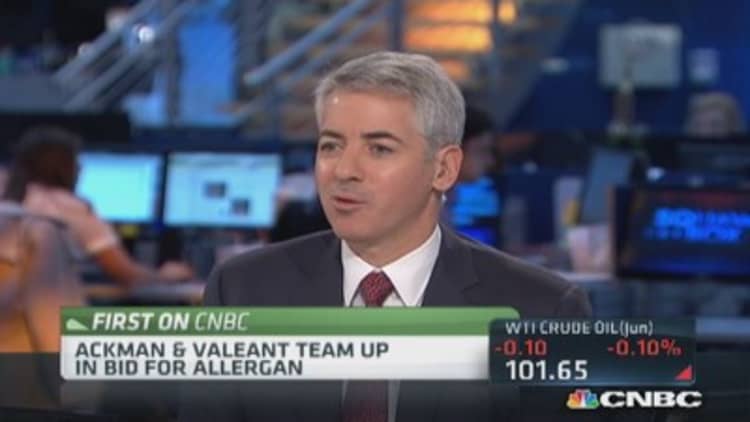
That same day, PS Fund 1 began snapping up stock in Allergan, adding to its position the next day. Its stock purchases came to a total cost of $75.9 million, the exact amount that Valeant had used to seed the partnership.
It was also the very most that a party in a proposed corporate transaction could purchase in the stock of a takeover transaction without triggering a required public filing under the Hart-Scott-Rodino Act, an antitrust provision overseen by the Federal Trade Commission (whose parameters happened to have changed on Feb. 24).
Since PS Fund 1 couldn't buy any more stock without the world knowing and, likely, juicing the price of Allergan at a time when it wanted to buy on the cheap, it then began purchasing options that gave it the right, but not the obligation, to buy stock at a future date, as well as some stock swaps that enabled it to buy Allergan in the future.
Read MoreHostile Allergan bid: Cramer hopes Ackman whiffs
Between March 3 and April 21, it spent more than $3.1 billion for the additional contracts, all of which were paid for by Pershing Square. (Ackman said at an investor conference on April 22 that his total investment was closer to $4 billion, and regulatory filings don't provide the costs of equity swaps PS Fund 1 bought in addition to the options and stock itself.)
Though spread out over the better part of two months, more than 40 percent of the options purchases occurred between April 11 and April 21, the date that the buyers announced their large position in Allergan. That is likely because SEC rules require that once a market participant acquires 5 percent of a stock, it must report the position within 10 days—a period during which the participant is free to buy additional shares.
By back-weighting those option and swap purchases, the fund stayed within the letter of the law, according to lawyers who have studied the transactions.
At the lengthy investor presentation on April 22, the day after PS Fund 1 revealed its stake in Allergan with a bid valuing the target company at about $46 billion, Ackman said he had made his Hart-Scott-Rodino filing with the FTC, and that he would convert his options into stock as soon as he received clearance to do so.
Presumably, that will be before the Allergan annual meeting on May 6, where shareholders will have a chance to vote on the proposed directors, executive compensation and a shareholder proposal that the board chairman be independent of the company.
Given that the Ackman partnership's stock position was relatively small as of March 11—the cutoff for shareholders who wanted their votes to be counted—Pershing Square and Valeant won't be able to use their expected 9.7 percent holdings in Allergan to affect much change.
But by posing tough questions at the podium or by advocating for reform with other investors at the meeting, they could create some fireworks.
—By CNBC's Kate Kelly.




